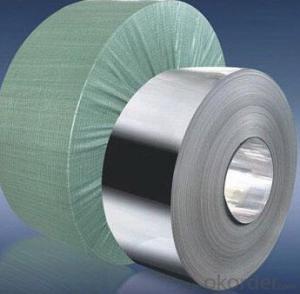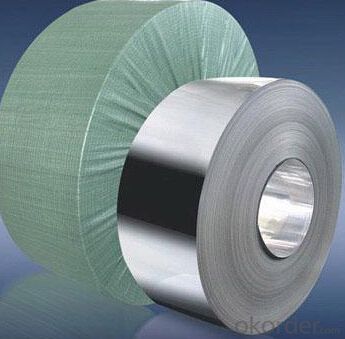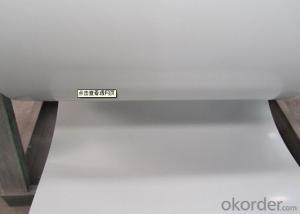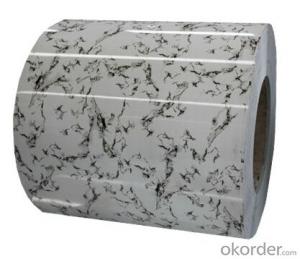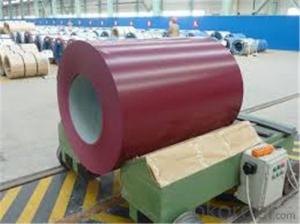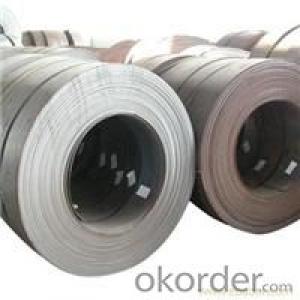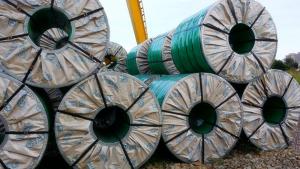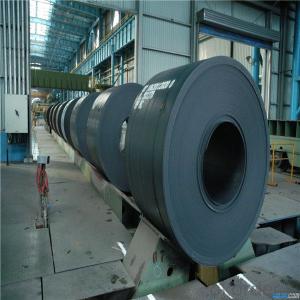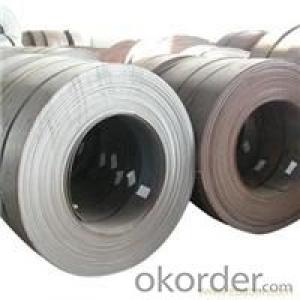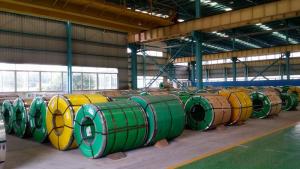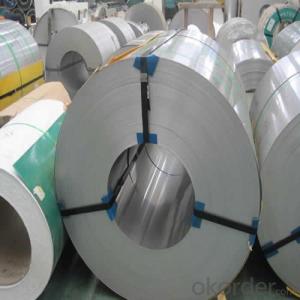Stainless Steel Hot Rolled Coil (201 202 430 409L)
- Loading Port:
- Shanghai
- Payment Terms:
- TT OR LC
- Min Order Qty:
- 25 m.t.
- Supply Capability:
- 10000 m.t./month
OKorder Service Pledge
OKorder Financial Service
You Might Also Like
Stainless Steel Hot Rolled Coil description:
Model NO.:201 202 430 409L
Type:Stainless Steel Strips
Shape:Round
Grade:200 Series
Certification:ISO, SGS, BV, RoHS, IBR
Perforated:Not Perforated
Standard:ASTM, AISI, GB, JIS, DIN, EN
Technique:Cold Rolled
Surface Treatment:Bright
Thickness:0.3mm-80mm
Width:1500*3000, 1500*6000, 1219*2438mm
Export Markets:North America, South America, Eastern Europe, Southeast Asia, Africa, Mid East, Eastern Asia, Western Europe
Additional Info.
Trademark:Std-steel
Packing:Standard Export Seaworthy Package, or as Required
Standard:AISI, ASTM, JIS, EN, KS, GB
Origin:Tianjin China
HS Code:72191429
Production Capacity:5000mt/ M
Product Description
Stainless Steel Hot Rolled Coil ( 201 202 430 409L)
As a lead manufacturer and supplier of steel coil stainless steel coil , etc, our products such as stainless steel 201, 202 , 304 , 304L , 309, 309S , 310 , 310S , 310L , 310H , 314, 316, 316L, 316Ti, 317, 317L, 321, 347, 347H , 409L , 420 , 430 , 434 , 444 , 904L , 2205 , 2304 , 2507 , 253MA ,254Mo , 654MO sheet plate are always available on stock. For cold rolled stainless steel sheet, thickness range from 0.3mm - 8.0mm, for hot rolled stainless steel plates, thickness range from 3.0-100mm.
We have bulit strategetic partnership with TISCO, POSCO, BAOSTEEL, LISCO several years. Customers shouldn't have concern with our products, product could endure time.
Section A:
Type: 201, 202, 304, 304L, 309S, 310S, 310H , 314 ,316, 316L, 316Ti, 317, 317L, 347, 347H , 321, 409, 409L, 410 420, 430, 444, 904L and 2205.
Martensite: Ss 409, 409L, 410, 420, 430 coil /roll ;
Austenite Cr-Ni -Mn: Ss 201 coil , ss 202 coil, J4 ss coil;
Austenite Cr-Ni: SS 304 coil , SS 304L coil, ss 309S coil , ss 310S coil;
Austenite Cr-Ni -Mo: Stainless steel 316 coil , stainless steel 316L coil;
Super Austenitic: 904L Stainless steel coil , 2205 stainless steel coil ,253MA stainless steel coil 254SMO stainless steel coil , 654MO stainless steel coil,
EN Standard:
Austenitic: 1.4372 ,1.4373, 1.4310, 1.4305, 1.4301, 1.4306 , 1.4833 , 1.4835 , 1.4845, 1.4841, 1.4401 , 1.4404 , 1.4571 ,1.4438, 1.4541 , 1.4878 , 1.4550 ,1.4539 , 1.4563.
Duplex: 1.4462 , 1.4362 ,1.4410 , 1.4507
Ferritic :1.4512, 1.400 , 1.4016 ,1.4113 , 1.4526 ,1.4521 , 1.4530 , 1.4749 ;
Martensitic: 1.4006 , 1.4021 ,S165M ,S135M
Section B:
Surface Finish: No. 1, No. 4, No. 8, 2B, 2D, BA, HL, Mirror, Brush, SB;
Product Available: Hot Rolled Steel Plate, Cold Rolled Steel Sheet, Cold Rolled
Edge: Mill, Slitting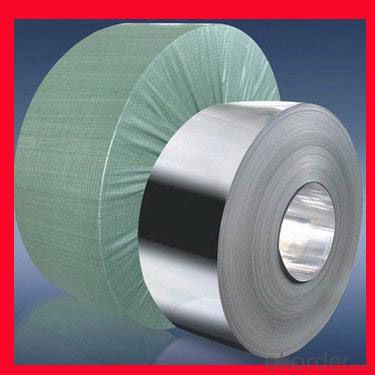
| Commodity | Stainless Steel Coil/Stainless Steel Roll | |||
| Material | 201 | |||
| Standard | GB | JIS | ASTM/ASME | DIN |
| 1Cr17Mn6Ni5N | SUS201 | 201 | 1.4372 | |
| Chemical Composition | C | Mn | P | S |
| ≤ 0.15 | 5.5-7.5 | ≤ 0.060 | ≤ 0.03 | |
| Si | Cr | N | Ni | |
| ≤ 1 | 16~18 | ≤ 0.25 | 3.5-5.5 | |
| Thickness | 0.3mm--6mm(cold rolled) 3mm--16mm(hot rolled) | |||
| Width | 1000mm--2200mm | |||
| Length | 1000mm-6000mm, as customers' request | |||
| Surface | BA/2B/NO. 1/NO. 3/NO. 4/8K/HL/2D/1D | |||
| manufacture | Hot Rolled/Cold Rolled | |||
| Packing | Packed in bundles with standard export sea-worthy package | |||
| Delivery Time | Within 15 working days, according to customers' quantities | |||
| Quality | High Quality. SGS inspection is accepted if needed | |||
| Place of Origin | Tianjin | |||
| Productivity | 500 MT/Month | |||
| Payment | T/T, L/C | |||
| MOQ | 1 MT | |||
| Application | Foodstuff, Gas, metallurgy, biology, electron, chemical etc. | |||
| Note | We can also do other materials | |||
- Q: what is the difference between METAL and STEEL?
- Metal is the generic name for several pure chemical elements and they alloys that can be made from them. Steel is used to designate alloys that consist mainly of iron, with a limited proportion of carbon in them.
- Q: What is the standard width of steel coils?
- Depending on the industry and application, the width of steel coils can differ. Generally, steel coils have a standard width range of 36 to 72 inches. The actual width is influenced by various factors including the type of steel, intended use, and the machinery involved in processing and handling the coils. To ensure the appropriate width for a specific steel coil application, it is crucial to refer to industry standards and specifications.
- Q: Hi, I would like to know if steel is an important material in desalination plants. If it is, could you specify what type of steel is used (i.e. flat steel products, long steel products, etc). Thanks.
- If stainless steels were used they would have to be high grade, high Chromium-Nickel alloyed stainless steels. The best in the range would be the Stainless Steel 316 series with superior corrosion resistance and strength. The downside to this is the expense. Carbon steel may be used but only if reinforced with a more corrosive resistant element
- Q: What are the common methods of joining steel coils?
- The common methods of joining steel coils include welding, mechanical fastening (such as bolts or screws), and adhesive bonding.
- Q: How are steel coils used in the manufacturing of exhaust manifolds?
- Steel coils are used in the manufacturing of exhaust manifolds as they provide the raw material for creating the manifold's structural components. These coils are typically cut, shaped, and welded to form the intricate and durable design required for efficient exhaust gas flow.
- Q: this is for a school project due morrow can u please answerwhat are disadvantages of stainless steelplease also show were u got info ty
- Disadvantages of Stainless Steel: 1. High initial cost 2. Difficult to fabricate, or in other words, it is not as malleable as other metals, say iron, and hence if not fabricated properly, results in costly re-work. 3. Difficult to weld 4. High cost of polishing etc. i.e. adding finishing touches for the market. Also, for the record: Stainless steel does NOT rust. One of the advantages of it over other metals (steel and iron) are that it is rust-free. But of course, depending on the environment condition (E.g. long periods in a rainforest without use at all) it can rust....this is a very rare (and unfortunate) situation. ;)
- Q: Went to top gun range in Houston, Tx. Guy there said no steel bullets..Anyone know why? Think i can shoot them anywhere else? Perhaps an outdoor gun range? The are monarch FMJ 9mm steel rounds..Thanks!
- Indoor ranges and ranges that provide steel targets don't like them because of the additional wear and tear on their equipment. Some outdoor ranges don't allow them because they can strike sparks when they hit rocks and cause a fire. Others don't care. Best to call ahead or check the range's web site, if any, to see what they allow and don't allow.
- Q: What are the pros and cons of non-stick and stainless steel pots and pans ?Thanks
- NEVER cook eggs in anything other than a nonstick pan. They stick real good! Though nonstick surface does wear off eventually and you have to get new ones..
- Q: What are the different coil winding methods used for steel coils?
- There are several different coil winding methods used for steel coils, each with its own advantages and applications. 1. Layer winding: This is the most common method used for steel coils. It involves winding the steel strip or sheet in concentric layers, one on top of the other, to form a coil. This method is ideal for thin, narrow strips and provides good stability and strength to the coil. 2. Cross winding: In this method, the steel strip is wound in a crisscross pattern, alternating the direction of each layer. This helps to distribute the stress evenly across the coil and prevents the coil from becoming unstable. Cross winding is commonly used for thicker or wider steel strips. 3. Spiral winding: This method involves winding the steel strip in a spiral pattern, forming a coil with a gradual increase in diameter. Spiral winding is often used for large or heavy steel coils, as it allows for easy handling and transportation. It also provides good stability and prevents the coil from collapsing. 4. Toroidal winding: This method is used for producing toroidal or donut-shaped coils. The steel strip is wound in a circular path, with each layer placed inside the previous one. Toroidal winding is commonly used in applications such as transformers, where the coil needs to have a specific shape and size. 5. Interleaved winding: This method involves interleaving two or more steel strips together during the winding process. Interleaved winding is used to produce composite coils with different materials or thicknesses. It provides enhanced strength, stability, and allows for customized designs. Each of these coil winding methods has its own advantages and is used based on the specific requirements of the steel coil application. The choice of method depends on factors such as strip thickness, width, tensile strength, and desired coil properties.
- Q: How are steel coils inspected for quality control purposes?
- Steel coils are inspected for quality control purposes through a combination of visual inspection, dimensional measurements, and various non-destructive testing techniques. This includes checking for surface defects, such as scratches or dents, as well as verifying the dimensions, weight, and shape of the coils. Additionally, technologies like ultrasonic testing, magnetic particle inspection, and X-ray examination are employed to detect internal defects, such as cracks or inclusions, ensuring that the steel coils meet the required quality standards.
Send your message to us
Stainless Steel Hot Rolled Coil (201 202 430 409L)
- Loading Port:
- Shanghai
- Payment Terms:
- TT OR LC
- Min Order Qty:
- 25 m.t.
- Supply Capability:
- 10000 m.t./month
OKorder Service Pledge
OKorder Financial Service
Similar products
Hot products
Hot Searches
Related keywords
